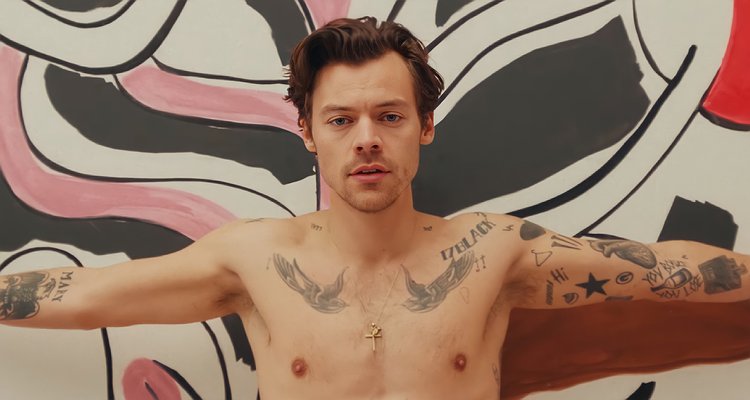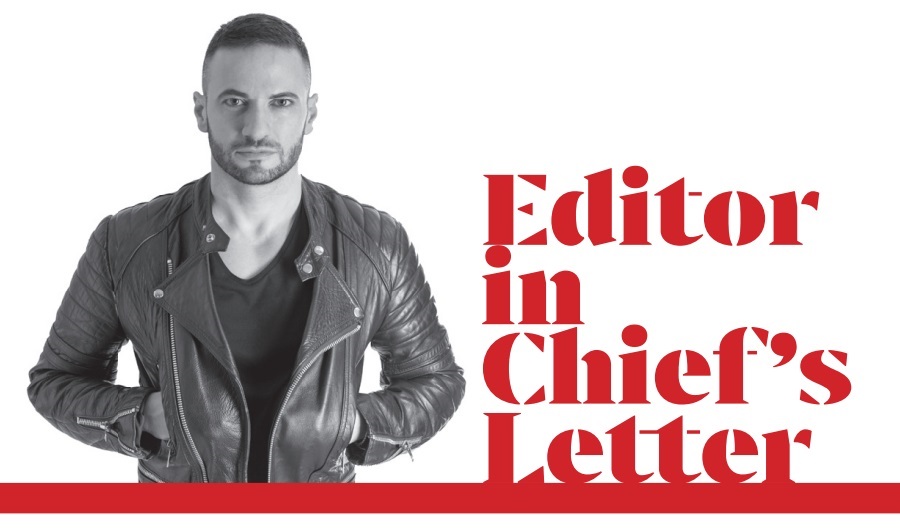‘Harry Styles queer-baiting accusations fail to recognise the full spectrum of human sexuality’
"Where the LGBTQ+ community seeks to change the world, we cannot then ask other people to stop deconstructing these tired sociocultural structures because they don’t fit our narrative," writes Attitude Editor-in-Chief Cliff Joannou.
By Will Stroude

Words: Cliff Joannou; Image: Amanda Fordyce for Rolling Stone
Harry Styles is right about one thing, we are all on a journey with our sexuality, and that journey can have unexpected turns on its way.
My sexuality has been in flux since I first flicked through the pages of my mum’s Next catalogue, stopping to gaze at photos of men in underwear. (Yes, I’m that old.) That early repression was down to the social expectation to be both straight and conventionally male in my outward appearance. As a result, confusion abounded, mostly because my inner voice knew I didn’t comfortably sit in either category.
After I got a blowjob in the sauna of a gay gym in New York when I was aged 17, my teenage self would have told you I was bisexual – a common deflection many closeted people use to avoid being labelled gay, which harms genuine bisexual people, leading to their identities being marginalised or negated entirely.

As I grew to be more comfortable with myself and challenged the shame that existed around my sexuality, I began to celebrate a gay identity. I experimented further and learned to discard stereotypes around bottom shaming, discovering the joys of being versatile and the pleasure of confident, comfortable intimacy. (Also translates to: I sucked a lot of cocks and had stacks of hot bum sex.) I also put myself in several quite dangerous situations. My journey is no different to that of many other gay men, but it was different because it was my journey.
So, around five years ago, when I had a couple of unplanned but enjoyable sexual encounters with women, it did make me wonder how that would define me. To claim a bisexual identity felt disingenuous and untrue, because in my heart of hearts, I still fantasised about and craved men. After sex with a trans man, some might label me as pansexual. Today, I tend to describe myself as queer, mostly because it feels more encompassing of how I view both my sexuality and gender. (Friends might just label me a hoe that enjoys sexual intimacy with the people I fancy, regardless of gender or sexuality.) I had been so conditioned to define myself as gay simply because I clearly wasn’t straight that I hadn’t allowed myself space to continue questioning or growing. (And I am not saying that every gay man is repressing themselves – of course not!)
The point is that the misconception of sexuality as a fixed, unchangeable aspect of our identity is not new. This can sometimes be even more prevalent amongst LGBTQ+ people, because the fact is for many of us, we did spend years struggling to assert our identity in a heteronormative, cisgender centred world. And when our identity is eventually asserted, we don’t want to think that it might again change, or we might discover a new aspect of our sexuality that stimulates us, speaking to us on a whole new level, leading us to question ourselves further. But once we let go of the expectation of our sexuality as a destination, and embrace it as an ever-evolving journey, the more we can fully engage with it.
View this post on Instagram
However, the world doesn’t like to operate in such naturally, fluid terms. Society wants to clearly define these boundaries, to demarcate living, breathing and loving sentient beings into acceptable, relatable formats. How the seven billion-plus people in the world are all supposed to conform to the rigid boxes through which oppressive social structures have for too long defined humanity is beyond me. Go back into history, and endless examples exist of people who lived life in a more multi-faceted manner. It’s only in recent times that society’s perception of this fluidity has become immutable.
This week, Harry Styles told Rolling Stone UK that he didn’t like to label his sexuality. “I think everyone, including myself, has your own journey with figuring out sexuality and getting more comfortable with it,” he told the magazine, to the ire of many.
Harry’s play with gendered clothing has led to some accusing him of queer-baiting, of a kind of performative queerness. Some argue it’s easy for him to pose on the cover of a magazine in gender non-confirming clothing, but harder for a queer person to walk down the street and live their authentic life. This is certainly true. But I’d also argue Harry follows in the footsteps of other high-profile musicians, actors and artists who have challenged gender binaries thus helping to alter the mainstream perception of outdated ways of living.
View this post on Instagram
Away from his image, Harry’s refusal to claim a sexual identity has frustrated others who demand to understand where this queer representation comes from, as if veering from traditional gendered roles is something only open to non-heterosexual people. This position feels reductive. Where the LGBTQ+ community seeks to change the world, we cannot then ask other people to stop deconstructing these tired sociocultural structures because they don’t fit our narrative.
Sexuality, and even gender, is a spectrum as expansive as humankind. Regardless of where Harry sits on those scales, the real question raised is about allyship – whether you identify as a white ally to the Black community, a man identifying as a feminist, or a perceived straight man engaging in queerness – and how you occupy a space that isn’t necessarily your own. How they engage with true allyship is the challenge that every person mindful to the struggle of others has to negotiate and respect. Whether this relates to Harry, or whether he achieves that through his work, is for Harry to be accountable in his own good conscience.
Me? I’ll carry on working on what it means to be authentic to my evolving identity, and hopefully continue to surprise myself every time I’m horizontal in my birthday suit.
